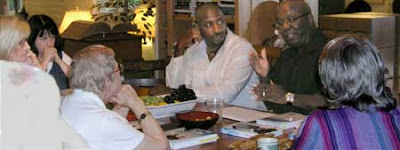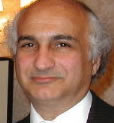Will all be drawn to God eventually or are we free to choose?
Must we be guided by the scriptures or by our hearts?
Is Christianity the only path?
Is Christianity the only path?
How can those who take different perspectives on these questions work together for good in a hurting world?

Opposites across the table?
At the table on my left, three strong, handsome, Black, Christian men, their bald heads seeming to emphasize their embodiment of the traditional virtues of piety, humility, and endurance: Bishop Phil Thomas of Highview Christian Fellowship flanked by his lieutenants Deacon Greg Coulter and Minister Eric Holder. On my right, two golden-haired women from the interfaith and New Thought movements: the older, Rev. Joyce Liechenstein who co-directs the One Spirit Interfaith Seminary in New York (OSIS), and the other--dressed in the flowing ochre robes of an angel--Rev Trish Hall of the Celebration Center of Spiritual Living in Falls Church, Virginia (CCSL). Anchoring the other end of the table from me was the woman who brought us together for this meeting, Laurie Bolster, who is both a practitioner at CCSL and a ministerial student at One Spirit.
The amazing and electric meeting was arranged at the request of Rev. Joyce who came down from New York to meet me and Bishop Thomas after Laurie passed her our book. The Sunday afternoon meeting capped a weekend of activities with local graduates and faculty of OSIS, including a book discussion at the home of faculty member Barbara Kinney and a visit to the morning meditation at CCSL and to the Highview service at which I was dancing.
 |
| Following meditation at Celebration Center for Spiritual Living, from left: Rev Joyce Liechenstein, Rev. Trish Hall, Rev. Rene Ragan, Barbara Kinney. The three guests are faculty of the interspiritual counseling department of OSIS, an arm of One Spirit Learning Alliance, OSLA |
 |
| Me on the left dancing at Highview. Click for Youtube. |
I can capture the essence of topics covered at this extraordinary meeting, but I can't capture the sparkling openness, humility, teasing, love, and spirit of cooperation that underpinned them.
Salvation vs. Enlightenment
I started the meeting by reading from page 89 of our book Bishop's surprising description of salvation.
In Buddhism and Hinduism and all those, you have to keep striving for perfection. You have to go through all those deaths and rebirths trying to learn lessons. But when you’re saved, you’re perfect now. There’s nothing else you have to do. So you have nothing to be afraid of. Your holiness is complete, right here, right now. And that is so magnificent, so freeing, so empowering, that if you really understood it, you’d never do anything to defile it.In the silence that followed, Bishop Thomas got the first of many laughs saying, "That's my story and I'm sticking to it."
I told the group I got so excited by how that definition echoes my understanding of "enlightenment," that I ran with it farther than Bishop T. is comfortable--to the place of knowing, as he himself said, that even the Ten Commandments no longer apply as I make my choices from love rather than from the law.
Scripture vs. Direct Revelation
This pulled Bishop T right back into our main dispute throughout the book: whether there is one standard we can rely on to know HOW to express love--the Bible as the "manufacturer's manual" on how best to run our lives. Rev. Trish jumped in to say indeed there is a standard, but the best way we can know it is through direct revelation.
Alexandria Hospital chaplain Ed Preston (who along with his wife Diane had opened their lovely home to us for the meeting) jumped in from the peanut gallery to remind us of the New Thought teaching that we all create our own realities.
"We can do that, but we'll have to take responsibility for the consequences of the realities we create," said Bishop T. Revs Trish, Joyce, and Ed echoed agreement.
Will All Return to the One or Can We Choose?
Rev Joyce, who at 75 and well under 5' makes me think of a diminutive medieval abbess crossed with a marketing CEO, flipped rapidly through her heavily marked Bible. She cited Saul, the prodigal son, and references in Ephesians and Colosians to God's "secret plan" to bring all creation together and make known that "Christ is in you." "These verse tells us that ALL will be returned to God," she said, "So who's going to mess with God's plan?"
"We are," said Bishop Thomas. "We mess up. 'Many are called, but few are chosen.'"
"I'm not so sure about that verse," said Rev Joyce. The Jesus seminar tells us we may have only a dozen accurate quotes from Jesus. So I like to pick and choose the verses that sound really good to me." (laughter)
"So do I," said Bishop Thomas (louder laughter). "Scripture says now we see darkly. But Christians believe we must choose to accept God's offer to return to Him. People are fee to choose not to return."
"Oh yes, we can refuse, but only for so long," said Rev. Joyce. She told of the book Testimony of Light, in which a deceased nun reports back to her friend that even in the shadowlands on the other side, angels come every day to continue bringing light. "Though I could be wrong," she said. The older I get, the more agnostic I am as I realize how much is mystery to us."
"Well I pray you're right, but the scripture tells me differently. This is where we'll have to agree to disagree."
Sermon Exchange!
As they plucked grapes from a bowl between them, Bishop Thomas said he doesn't like to get involved in theological discussions like this while people are hurting. "We pastors are like the fellows who cut a hole through the roof to get their paraplegic friend to Jesus for healing. We have to do whatever it takes; we have to cut a hole through the roof while everyone else is dallying."
Rev. Trish agreed heartily. "We need to learn how to move people into a better understanding of what we call enlightenment: getting our human selves out of the way so we can have that greater experience of God as light."
"Well I could let you preach that at my church," said Bishop Thomas.
"Sermon exchange!" exclaimed Laurie and I simultaneously.
"Well I could let Rev. Trish preach at my church," said Bishop T. Even with the people who are far out in New Thought, like Dale (referring to the top of page 130 in our book), the errors they make are erring on the side of love. My people would understand that. But I would have to be careful what I said in your church because folks are so sensitive about how things are said. I can sound a little rough sometimes because of my Pentecostal upbringing."
Marching in Iambic Pentameter
| Bishop T said pastors must do like Sergeant Carter in the old TV comedy Gomer Pyle: While all the other marines are marching in order, someone must correct Gomer who's always out of step, "marching in iambic pentameter." (Bishop T. has a way of creating poetry on the fly like this, but the broad grin I withheld turned to awe when I later checked the definition of Iambic pentameter: a particular rhythm that groups of syllables called "feet" establish in a line of verse, a line made up of five pairs or "iambs" of short/long, or unstressed/stressed, syllables. |  |  |
As the meeting came to a close, Bishop Thomas said, "We're not going to solve our differences. I hope discussions like this can help us find enough common ground that we are not bickering and can work together to impact the world in the way God wants it impacted, leading people to a life of abundance in Him."
I believe there was more love and trust in the world at the end of this meeting--and more clarity as well.







 Amy Roth of
Amy Roth of 
